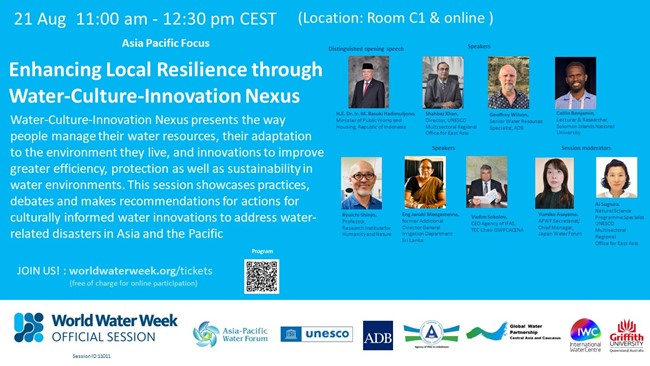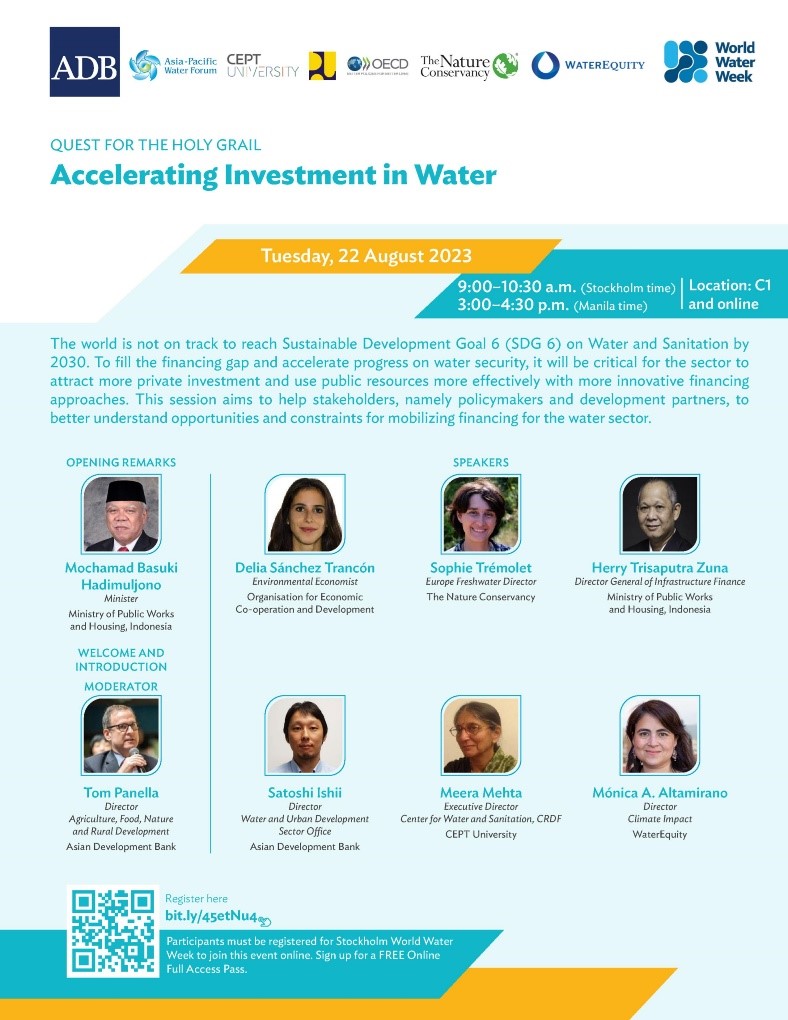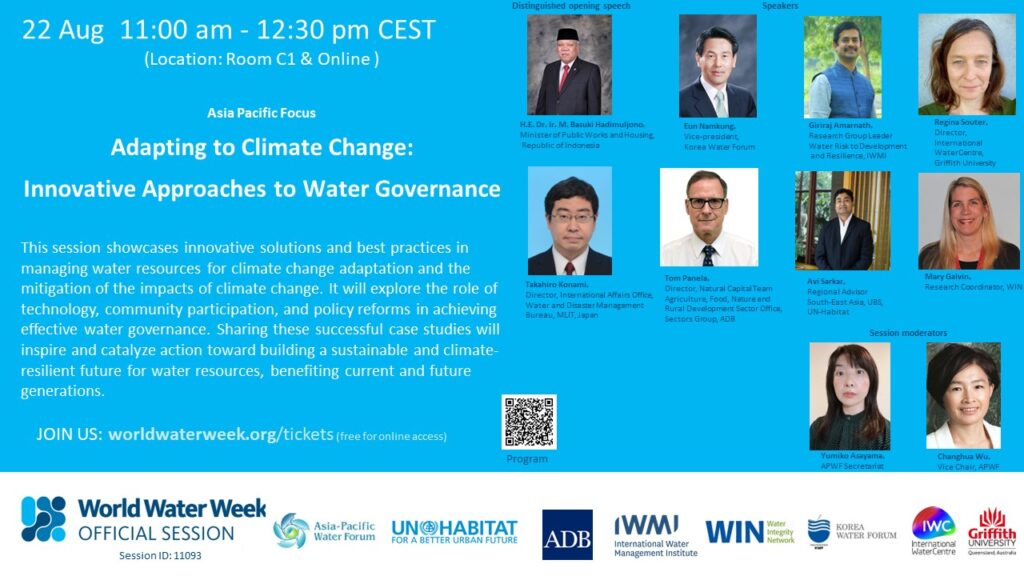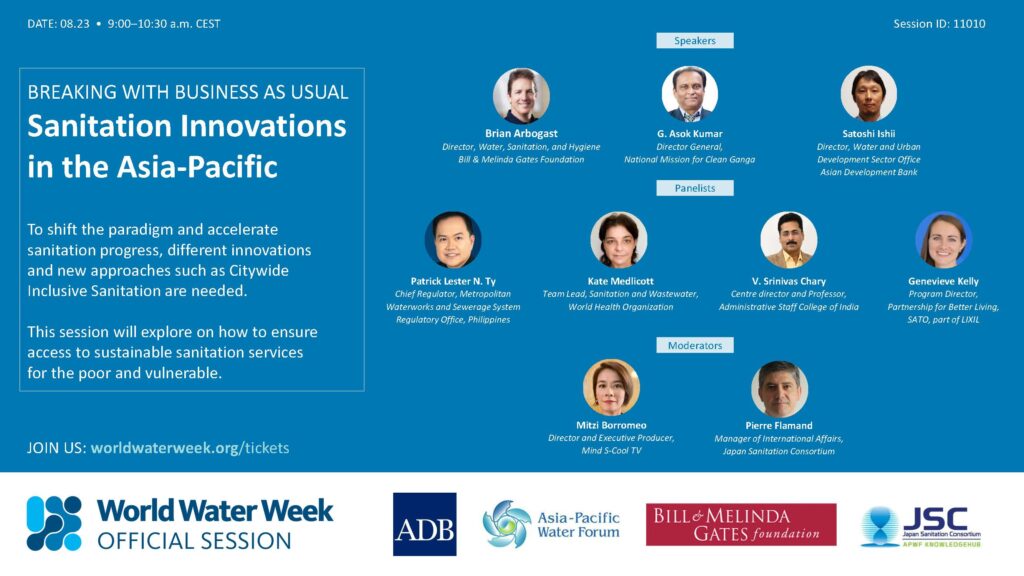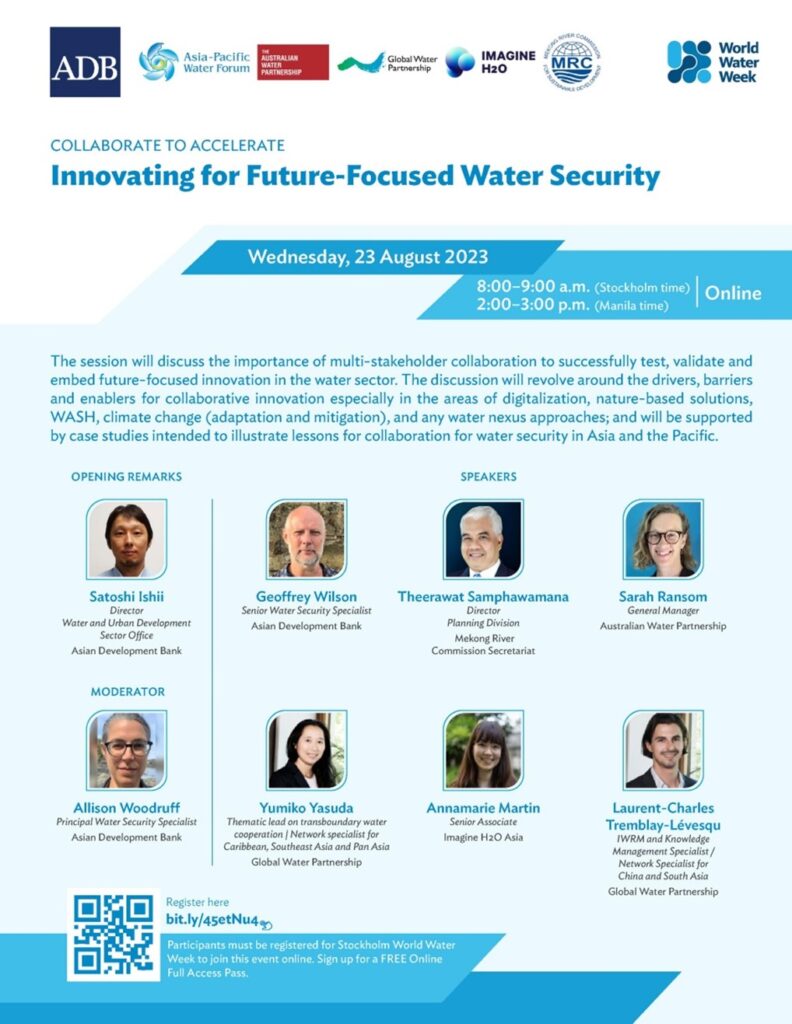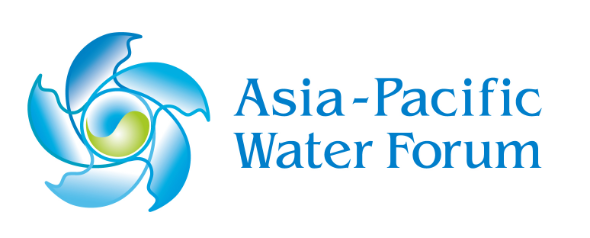
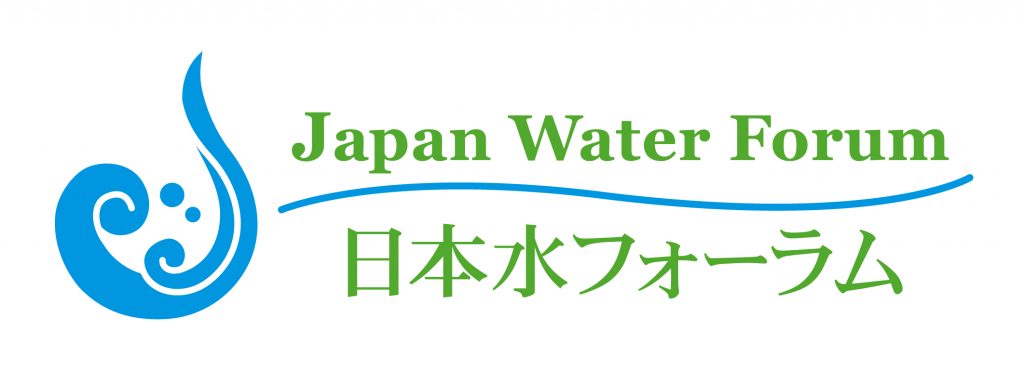
Stockholm World Water Week 2023 Asia-Pacific Focus Session
Stockholm World Water Week will be held in a hybrid format from the 20th to the 24th of August, 2023. The theme of this year is “Seeds of Change: Innovative Solutions for a Water-Wise World.”
Asia-Pacific Water Forum (Secretariat: JWF) is organizing the 5 sessions with our co-partner organizations in line with this year’s topic.
1: Enhancing Local Resilience through Water-Culture-Innovation Nexus
- 21st August 11:00 am – 12:30 pm CEST (Hybrid)
- Conveners: APWF, UNESCO multisectoral Regional Office for East Asia, Asian Development Bank (ADB), GWP CACENA, International WaterCentre
2: Quest for the Holy Grail: accelerating investment in water
- 22nd August 2023, 9:00 am – 10:30 am (Hybrid)
- Convenors: ADB, APWF, OECD, WaterEquity
3 Adapting to Climate Change: Innovative Approaches to Water Governance
- 22nd August 11:00 am -12:30 pm CEST
- Conveners: APWF, United Nations Human Settlements Programme (UN-HABITAT), ADB, International Water Management Institute (IWMI), International WaterCentre, Korea Water Forum, Water Integrity Network (WIN)
4. Breaking with Business as Usual: Sanitation Innovations in the Asia-Pacific
- 23rd August 9:00 am -10:30 am (Hybrid)
- Convenors: Japan Sanitation Consortium (JSC), ADB, APWF, Bill and Melinda Gates Foundation (BMGF)
5 Collaborate to Accelerate: Innovating for future-focused water security
- Wednesday 23 August, 8:00am – 9:00am CEST (Online)
- Convenors: Asian Development Bank, Asia-Pacific Water Forum, Australian Water Partnership, Global Water Partnership, Imagine H2O.
Join Us! Participation online is free of charge.
Registration for Stockholm 2023 https://www.worldwaterweek.org/tickets
The overall program of Stockholm 2023 is
https://worldwaterweek.org/programme-2023
◆Overview of each 5 session co-organized by the APWF
1: Enhancing Local Resilience through Water-Culture-Innovation Nexus
21st August 11:00 am -12:30 pm CEST (Hybrid) Location: C1
Conveners:
APWF, UNESCO multisectoral Regional Office for East Asia, ADB, GWP CACENA, International WaterCentre
Water, culture, and innovation have been strongly interlinked throughout human history. Water is vital to all forms of life on earth, and culture greatly determines our coexistence with nature. Innovation has been the driver for enhancing water availability and protection against water-related disasters. Water-Culture-Innovation Nexus presents how people manage their water resources, their adaptation to the environment in which they live, and innovations to improve greater efficiency, protection, and sustainability in water environments.
”Early Warning for All” is imperative in Asia and the Pacific, where two-thirds of the global deaths and victims of water-related disasters occur annually. The region bears half of the estimated global economic brunt from catastrophes. But such losses could be prevented and reduced significantly if the local indigenous knowledge along with historical and cultural heritage and wisdom deeply rooted in local communities, can be better understood and expanded to deploy in dealing with water-clustered disasters. And the costs for the early warning will considerably decline accordingly. Precaution, prevention, and protection informed by local and indigenous knowledge are vital principles in early warming. By integrating water culture and innovation into an early warning system and the other hard and soft measures, one can create a holistic approach that leverages both the latest technological advancements and the collective wisdom of communities, ultimately enhancing the overall effectiveness of disaster risk reduction efforts. We need to understand better the nexus of water-culture-innovation for countries and communities in the region, particularly the role of culture in our present and future early warning and hydrologic solutions.
This session shares evidence-based practices and intellectual development that will help shape the resilience framework, discuss how best to utilize the well of wisdom in our region and deliver recommendations for actions to decision-makers in the region for culturally informed water innovations.
Program
|
Session Introduction: Yumiko Asayama, APWF Secretariat c/o Chief Manager, JWF |
|
Distinguished Opening Speech: |
|
Presentations: |
|
ADB experiences on community-based DRR and FFEWS |
|
Solomon Islands case |
|
Water resources of Ryukyu islands, southernmost Japan |
|
Enhancing Local Resilience through Water-Culture-Innovation Nexus in Sri Lanka |
|
New-fashioned Water Governance in Central Asia to Make Future Water Developments Viable and Durable |
|
Panel discussion and interaction with the audience |
|
Wrap up |
2: Quest for the Holy Grail: accelerating investment in water
22 August 2023, 9:00 am-10:30 am (Hybrid Format) Location: C1
Convenors: Asian Development Bank, Asia Pacific Water Forum, OECD, WaterEquity
The session will present an overview of the current water security financing needs in Asia and the Pacific. The session will also examine challenges in attracting private sector investment, how to use public sector financing more effectively and efficiently to support water security, as well as other innovative financing tools. It will present good practices and cases from the region on overcoming these identified challenges to attract and sustain investment in water.
Program
|
Welcome and introduction from Session Moderator |
|
Distinguished Opening Speech: |
|
Presentation 1: What factors contribute to the enabling environment for water finance? Presentation of Score Card for selected Asian countries. |
|
Presentation 2: Accelerating investment in water and nature to protect and restore ecosystems |
|
Presentation 3: Accelerating investment in Indonesia’ water sector |
|
Presentation 4: Investor views for opportunities to invest in water and sanitation |
|
Presentation 5: Transitioning water utilities from sovereign to non-sovereign borrowing in Vietnam |
|
Presentation 6: Leveraging private investment in the sanitation and wastewater sector in India |
|
Q&A/Interactive discussion among panelists |
|
Summary and Closing |
3: Adapting to Climate Change: Innovative Approaches to Water Governance
22nd August 11:00 am -12:30 pm CEST (Hybrid format) Location: C1
Conveners: Asia Pacific Water Forum, United Nations Human Settlements Programme (UN-HABITAT), Asian Development Bank, International Water Management Institute (IWMI), International WaterCentre, Korea Water Forum, Water Integrity Network
Overview
The session aims to showcase innovative solutions and best practices in managing water resources for climate change adaptation and the mitigation of the impacts of climate change. The session will explore the role of technology, community participation, and policy reforms in achieving effective water governance. By sharing these successful case studies, the session aims to inspire and catalyze action toward building a sustainable and climate-resilient future for water resources, benefiting current and future generations.
Program
|
Session Introduction: Yumiko Asayama, APWF Secretariat c/o Chief Manager, Japan Water Forum |
|
Distinguished Opening Speech: |
|
Presentations |
|
Dr. Avi Sarkar Regional Advisor – South-East Asia, UBS, UN-Habitat |
|
Dr. Giriraj Amarnath, Research Group Leader – Water Risk to Development and Resilience, International Water Management Institute (IWMI) |
|
Dr. Tom Panela, |
|
Mr. Takahiro Konami, Director, International Affairs Office, Water and Disaster Management Bureau, Ministry of Land, Infrastructure, Transport, Tourism (MLIT) Japan |
|
Dr. Eun Namkung, Vice-president of Korea Water Forum |
|
Dr Mary Galvin, Research Co-ordinator, Water Integrity Network |
|
Panel discussion and interaction with the audience |
|
Wrap up |
4. Breaking with Business as Usual: Sanitation Innovations in the Asia-Pacific
23rd August 9:00 am -10:30 am (Hybrid) Location: C1
Convenors: Japan Sanitation Consortium (JSC), Asia-Pacific Water Forum (APWF), Asian Development Bank (ADB), Bill and Melinda Gates Foundation (BMGF)
Ensuring access to sanitation services can be a major challenge for the poor and vulnerable. Poor households have limited funds and may prioritize other expenditures over sanitation, particularly as willingness to pay for these services and understanding the benefits of investing in sanitation are generally low. Even for the motivated ones, the costs of sanitation services – that is, the initial cost for ensuring access, but also the recurrent costs for management and maintenance – can be a major barrier to inclusive sanitation. Informal settlements house also the poor and marginalized in zones usually located outside the municipal areas receiving or targeted for sanitation services. The goal of Citywide Inclusive Sanitation (CWIS) is to ensure that everyone has access to sustainable sanitation services. This requires several steps such as Identifying and targeting poor and marginalized households, generating demand for sanitation through awareness-raising communication, involving communities in decision-making for project ownership, designing financial schemes with different options and accountable mechanisms, and monitoring. This session will explore several of these aspects through different perspectives.
Program
|
Introduction |
|
Panel discussion Moderator (Online):Ms. Mitzi Borromeo (Award-winning Broadcast Journalist with CNN Philippines) |
|
Summary and concluding remarks |
5 Collaborate to Accelerate: Innovating for future-focused water security
Wednesday 23 August, 8:00 am – 9:00am CEST (60 minutes)
Convenors: Asian Development Bank, Asia-Pacific Water Forum, Australian Water Partnership, Global Water Partnership, Imagine H2O.
The session will discuss the importance of multi-stakeholder collaboration to successfully test, validate and embed future-focused innovation in the water sector. The discussion will revolve around the drivers, barriers, and enablers for collaborative innovations on digitalization, NBS, WASH, climate change, and water-nexus approaches; and will be supported by case studies.
Program
Moderator: Allison Woodruff, Principal Water Security Specialist, ADB
|
Welcome/Introduction |
|
Presentation 1: Asian Development Bank |
|
Presentation 2: Mekong River Commission Secretariat (MRCS) |
|
Presentation 3: Australian Water Partnership (AWP) |
|
Presentation 4: Global Water Partnership (GWP) |
|
Presentation 5: Imagine H2O Asia |
|
Panel Discussion |
|
Summary and Closing |
(Reported by Yumiko Asayama, Chief Manager)
